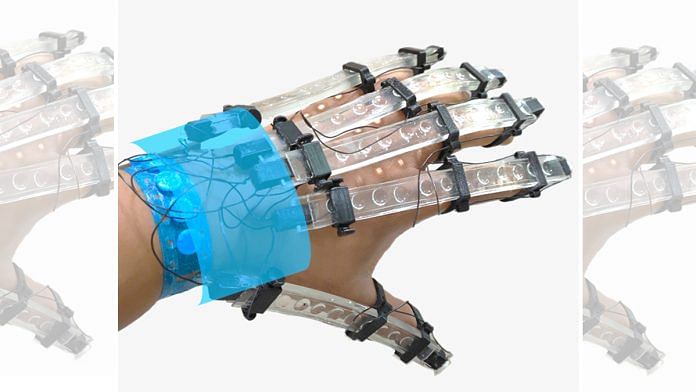New Delhi: A team of scientists from the Indian Institute of Science (IISc) has developed a 3D-printed, remotely controlled glove that could open up the possibility of conducting online physiotherapy sessions for stroke patients.
Stroke is a leading cause of disability worldwide.
According to the IISc team, while physiotherapy can help rehabilitate stroke patients, the process can take days to months.
Another challenge, they said in a statement, is that physiotherapy requires daily hospital visits.
Home visits by professionals or sophisticated devices to monitor patients remotely can often be expensive and inaccessible.
“We wanted to develop something affordable, and available to a person at all times at their convenience. The product should be easy to use and must provide feedback,” said Aveek Bid, associate professor in the Department of Physics, whose team has developed the device.
The soft, wearable device, entirely designed and manufactured in India, is expected to cost less than Rs 1,000, the researchers said. A patent has been filed and the researchers hope to launch it in the market soon.
The device, they added, can be used in augmented reality games and applications as well.
Also Read: ISRO-IISc team develops prototype of bacteria-infused bricks for Martian, lunar soil
Properties of light
Explaining the working of the glove, Bid explained that quantifiable feedback — such as the units of pressure applied while squeezing a ball, or the degree a leg with an injured knee is bent — is crucial for doctors to monitor a physiotherapy patient remotely.
The device developed by the team can address these challenges, he said in the statement.
“The idea behind the device is that you wear something like a glove, the physiotherapist controls the device from a remote location through the internet, and makes your hands and fingers move,” Bid said.
According to the researchers, the device senses various hand and finger movements, and detects parameters like pressure, bending angle and shape with precision.
The technology that drives the device is based on the fundamental properties of light — primarily how it reflects and bends.
A light source is placed at one end of a transparent rubbery material, and the other end has a light detector.
Any movement in the finger or arm of the patient causes the flexible material to deform. The deformation alters the path of light, and thereby its properties. The device translates this change in light properties to a quantifiable unit.
Since light travels across the entire length of the device, movement along any part of the patient’s finger or arm can be accurately measured, according to the team.
The device is so sensitive that it responds to the touch of a butterfly, said Abhijit Chandra Roy, one of the scientists behind the project.
While existing devices can only detect the bending of a finger, the new device can even measure the degree of bending at every joint of the finger, he said.
The team used a silicon-based transparent polymer material that can be 3D-printed, making it possible to customise it to fit each patient’s arm and fingers.
The device can also capture and store data, and transmit it over the internet, facilitating remote monitoring by clinicians or physiotherapists.
The researchers say that the device has been tested for stability for over 10 months, and no loss of sensitivity or accuracy was found.
(Edited by Sunanda Ranjan)
Also Read: IISc Bangalore’s entry in QS World Rankings isn’t a surprise. It was just a matter of time



